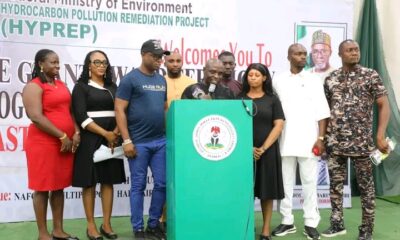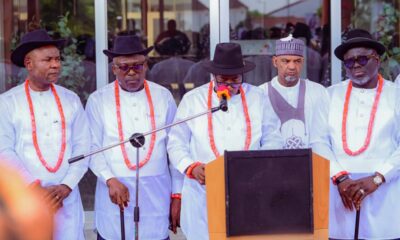News
Stakeholders Urge Upscale In Modular Refineries’ Activities … Task FG To Subsidise License By 70%
Stakeholders in the management of oil and gas have stressed the need to scale up the activities of the modular/artisanal refineries in the Niger Delta for more economic benefit to the country.
The stakeholders also harped on the need for the Federal Government to consider the subsidisation of modular/artisanal refinery license by 70percent in order to allow artisanal operators to acquire these licenses.
These were part of the resolutions reached at the end of the second stakeholders’ engagement on integration of modular/artisanal refinery operations convened by the Office of the Presidency through the Special Assistant to the President on Niger Delta Affairs, Senator Ita Enang in Abuja.
Addressing the gathering, yesterday, Senior Special Assistant to President Muhammadu Buhari on Niger Delta Affairs, Sen. Ita Enang explained that the aim of the meeting was to discuss ways out of the country’s present oil challenge.
Enang stated further that the gathering was also focusing on the review of the causes of losses of revenue from oil due to irregular activities in the creeks and along oil pipelines and the effect it had on the nation’s economy.
According to him, the world is faced with an energy crisis, and all the nations of the world are now looking to internal sources of solving their problems and Nigeria is not left out.
“Domestic refining which we call artisanal refining is part of the internal sources of solving these problems, but these refined products are going into our generators, going into our systems, and we still call it illegal refining.
“But we are driving our cars with it and we still call it illegal refining, people are feeding from it and we still call it illegal artisanal refining”.
Enang said it was high time for the country to regularise the artisanal refined products for the purpose of saving the nation’s economy.
“It is time for us to meet and regularize it for the purpose of saving the economy,” Enang said.
In his remark, Vice-Chancellor, Federal University of Petroleum Resources, Effurun, Prof. Akpofure Rim-Ruke, who welcomed the idea of the forum, said it would salvage the challenge of fuel crises and loss of revenue.
According to him, the youths are using the local process of producing local gin to produce the fuel which is the local technology that works.
“Having this at the back of our mind to see that the products they have produced, Federal University of Petroleum Resources has tested the products and it is actually in line in terms of specificity with others that are imported into this country, so the technology is working.”
On the way forward, he said the institution had developed an indigenous modular refinery and it was already on ground the authority of and that the institution has all it takes to train the youths on it.
On his own, executive secretary, Nigeria Extractive Industries Transparency Initiative (NEITI), assured the stakeholders of the agency’s support to the full operation of modular refineries in the country.
According to him, the project is a passionate one not only for the oil sector but for the entire nation for a way out of the fuel crises and loss of the nation’s revenue.
A communique issued at the end of the meeting read in part: “Scale up the activities of the modular/artisanal refineries in the Niger Delta for more economic benefit to the country.
“Government should take inventory of the domestic modular/artisanal refinery operators and send them to the Federal University of Petroleum, Effurun (FUPRE) for further training.
“Need for formalisation of the modular/artisanal refinery operators in Nigeria.
“Subsidisation of modular/artisanal refinery license by 70percent in order to allow artisanal operators to acquire these licenses.
“Curb the activities of the security personnel involved in illegal bunkering in the Niger Delta
“Need for continuous interface between the Federal Government and the operators of modular/artisanal refineries in the country to assist the government in curbing cases of illegal bunkering
“The government should minimize their threats in order to allow artisanal operators to come out to engage more with the government.
“Opening up of the petroleum industry process to allow for more participation, including the modular/artisanal operators.
“Approve the implementation of the recommendations from the first stakeholders’ engagement.
“The Federal Government should approve the formation of the Presidential Artisanal Crude Oil Refining Development Initiative (PACORDI).
“Foreign Technical Partners who are willing to invest in the oil industry in the country should be encouraged to partner with the artisanal operators with the involvement of the communities.
“The Federal Government through the Amnesty Programme has trained a lot of engineers, welders and fabricators hence should be included when the modular/artisanal refineries would be set up/formalised.
“Emphasis must be placed on the safety of the people of the Niger Delta in the operations of the modular/artisanal refineries.”
News
Fubara Attends PDPGF Meeting In Asaba …..Back Court Verdict On National Secretary Position

Rivers State Governor, Sir Siminalayi Fubara, last Friday, attended the Peoples Democratic Party Governors’ Forum (PDP-GF) meeting in Asaba, the Delta State capital.
The Rivers State Governor, who is the Vice Chairman of the PDP Governors’ Forum, attended the meeting, alongside 10 other Governors of the party’s controlled states across the six geopolitical zones of the country.
The first PDPGF meeting in 2025, was held at the Government House in Asaba, at the end of which a seven-point resolution was reached.
Reading the communique at the end of the meeting, the Chairman of the Forum, and Governor of Bauchi State, Senator Bala Mohammed urged the National Working Committee (NWC) to put every machinery in place to ensure a hitch-free NEC meeting on March 13, 2025.
The communique stated:
“The Forum, having examined all the notices required by law to be given to validly convoke NEC, advised NWC to reschedule NEC to the thirteenth (13Th) of March 2025.”
The Forum further noted the Court of Appeal judgment affirming Udeh Okoye as the National Secretary of the party, saying that as a party that believes in the rule of law, it will respect the position of the Appellate Court on the matter.
“The Forum noted with delight the ongoing efforts at resolving the crisis in the National Working Committee, NWC, on the position of the National Secretary, and has reaffirmed its support for the Court of Appeal judgment; consequently, the Forum advised the NWC to set up the machinery for the effective implementation of the court judgment.
“While commending the country’s valiant and patriotic Armed Forces and Security Agencies for maintaining the frontline in securing the country and the gains of our gallant personnel against bandits in parts of the country, the Forum viewed with deep concern, the resurgence of brazen non-state actors. It, therefore, calls for the strengthening of the nation’s security architecture.”
Governors in attendance include: H.E Senator Bala Abdulkadir Mohammed (Bauchi State); H.E Sir Siminalayi Fubara (Rivers State) – Vice Chairman; H.E Rt. Hon. Sheriff Oborevwori (Delta State) – Host; H.E Dr. Agbu Kefas (Taraba State); H.E Rt. Hon. Ahmadu Umaru Fintiri (Adamawa State); and H.E Dr. Dauda Lawal (Zamfara State).
Others are H.E Senator Ademola Adeleke (Osun State); H.E Senator Douye Diri (Bayelsa State); H.E Pastor Umo Eno Ph.D (Akwa Ibom State); H.E Dr. Peter Mbah (Enugu State); H.E Barr. Caleb Mutfwang (Plateau State);
and H.E Bayo Lawal (Deputy Governor, Oyo State), who represented Governor Seyi Makinde.
News
NGO Implants Free Pacemakers Into 22 Cardiac Patients In PH
A United States based Non Governmental Organisation, Cardiovascular Education Forum, in collaboration with the University of Port Harcourt Teaching Hospital (UPTH), has successfully implanted free pacemakers into 22 patients with different cardiac cases in Port Harcourt.
This is in a bid to save lives and encourage patients with low heartbeats to live longer.
The implantable device, which costs $20,000 each, was inserted free of charge on the selected patients.
Speaking during a Special Hospital Ground Rounds at the UPTH with its Theme, “Recent Advances in Cardiac Pacing,” a cardiac Physiologist, Dr Neil Grub, said the NGO was in Nigeria to improve training and learning on cardiac issues and help patients with cardiac problems.
Accompanied by a team of experts comprising a cardiologist and cardiac device implanter, Dr Jagdeep Siagh, and UPTH interventional cardiologist, Dr Edafe Emmanuel, Dr Grubb said pacemakers were inserted on patients with low heartbeats to boost their heart rates.
Earlier, the Chief Medical Director, UPTH, Prof Henry Arinze Ugboma, said each of the implantable devices cost over $20,000.
Ugboma, represented by the Chairman, Medical Advisory Committee, UPTH, Prof Datonye Alasia, said the partnership between UPTH and the foreign NGO was to build networks, and improve services in terms of healthcare delivery, training and learning.
According to him, there is now a ray of hope in terms of treatment of patients with cardiovascular cases in the hospital.
He said the UPTH started the collaboration with Cardiovascular Education Forum in 2018 to boost health, training and learning on cardiac health.
He assured that, “in coming years, the scale of our collaboration with the mission will be higher.”
Chinedu Wosu
News
FG Unveils National Broadband Alliance To Drive Internet Access
The Federal Government has unveiled the National Broadband Alliance, a new initiative aimed at transforming the nation’s digital infrastructure and boosting connectivity across the country.
The initiative was unveiled yesterday in Lagos by the Minister of Communications, Innovation, and Digital Economy, Bosun Tijani, who was represented by the Executive Vice Chairman of the Nigerian Communications Commission, Aminu Maida.
In his address, Tijani stated that NBAN would significantly enhance broadband penetration, which has grown from just six per cent in 2015 to approximately 42 per cent as of October 2024.
To support this agenda, he said the government was leveraging a Special Purpose Vehicle to deploy 90,000 km of fibre backbone across the nation, connecting underserved and rural communities to high-speed internet.
According to him, the initiative aligns with the Renewed Hope Agenda of President Bola Ahmed Tinubu, which prioritises innovation, technology, and collaboration as key drivers of national prosperity.
Tijani stated that the expansion would not only improve access to reliable broadband but also empower Nigerians, particularly in rural areas.
“While the progress made in broadband penetration is commendable, we recognise that much more needs to be done to ensure every Nigerian can enjoy the benefits of reliable, high-speed internet,” Tijani said.
The minister also emphasised the importance of strategic partnerships with donors, investors, and other key stakeholders in achieving the goals set out in the National Broadband Plan (2020–2025).
He said these collaborations would be essential in overcoming infrastructure development challenges and making broadband affordable and accessible for all Nigerians.
“These targets reflect our unwavering commitment to ensuring that broadband is accessible, affordable, and inclusive for all Nigerians. However, we are also aware of the challenges ahead,” he added.
Tijani stressed that achieving the government’s targets—70 per cent broadband penetration by 2025, a minimum internet speed of 25 Mbps in urban areas, and broadband access for 80 per cent of the population by 2027—will require sustained efforts.
“Achieving these goals will require more than just the efforts of the private sector. It will require a holistic approach that includes strategic partnerships with donors, investors, and other key stakeholders in accelerating the rollout of critical infrastructure,” he said.
-
Business5 hours ago
Oil Production Resumption: Ogoni Youths Seek Inclusion In FG’s Plans
-

 News7 hours ago
News7 hours agoSenate Reshuffles Committees, Appoints New Chairmen For Dev Commissions
-

 Nation5 hours ago
Nation5 hours agoBizman Alleges Threat To Life …Seeks Police , Govt’s Intervention
-
Rivers5 hours ago
NOSDRA D-G Disburses N150m To 300 Farmers In Rivers
-

 Niger Delta4 hours ago
Niger Delta4 hours agoOgoni Postgraduate Forum Tasks HYPREP On Scholarship Scheme
-
Business5 hours ago
NCDMB Assures Greater Local Industry Participation In Oil, Gas Projects
-

 News7 hours ago
News7 hours agoNigeria Strengthens Economic Ties With Germany To Boost Investment, Jobs
-

 Featured4 hours ago
Featured4 hours agoFubara Flags Off Upgrading Of 135 Primary Healthcare Facilities In Rivers

